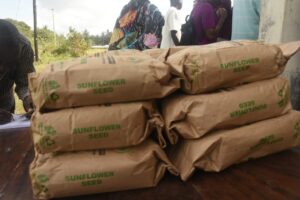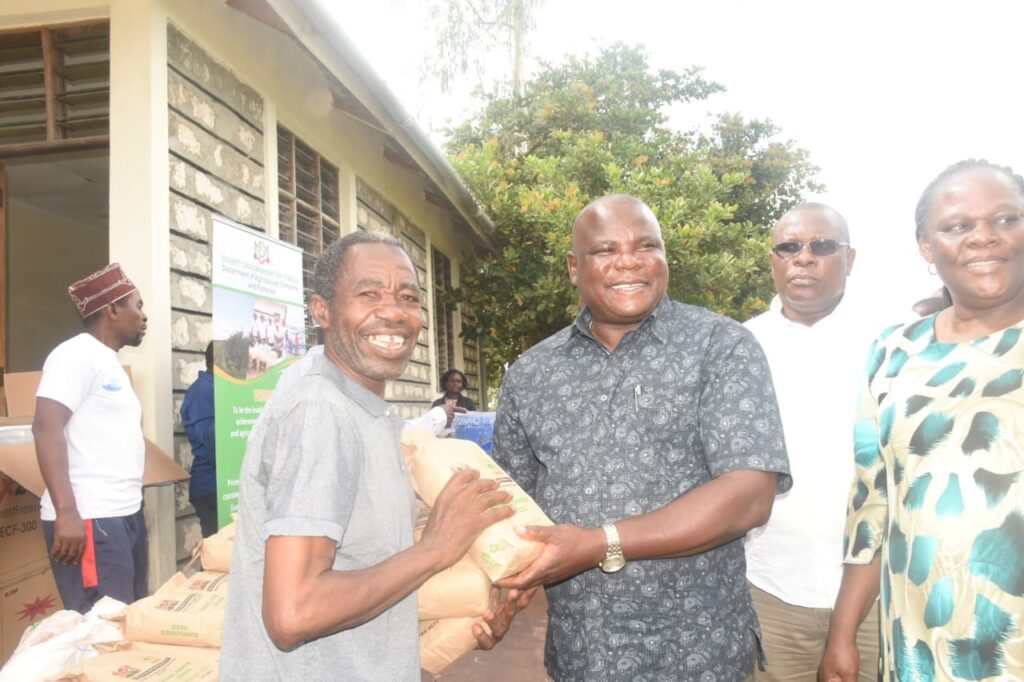BY SHABAN OMAR
More than 100 fisherfolk and sunflower farmers from Pongwe-Kikoneni in Kwale County are set to improve their productivity following the distribution of essential tools and seeds by the county government.
The initiative aims to enhance food security and economic empowerment within the region, providing much-needed support to the two vital sectors.
The fisherfolk, a group comprising both men and women, received an array of fishing gear designed to improve their efficiency and capacity.
Among the items distributed were fishing nets, 20-litre cooler boxes, fish finders, fish display boxes, flippers, masks, and snorkel sets.
The gear will be distributed across 23 Beach Management Units (BMUs) in the region, ensuring that a broad section of the fishing community benefits from the county’s efforts.

The sunflower farmers received three kilograms of seeds per farmer, which is enough to cover an acre of farmland.
The county is encouraging sunflower farming as part of a diversification strategy to reduce reliance on maize and other traditional crops.
Sunflowers are a high-yielding and drought-resistant crop, making them suitable for the region’s semi-arid conditions.
Speaking during the distribution, Deputy Governor Chirema Kombo said the tools are expected to not only increase the amount of fish caught but also improve the quality of the fish by allowing them to store and transport their catches in better conditions.
“The use of cooler boxes will help in preserving the freshness of fish during the often long trips from the fishing waters to the markets, preventing losses caused by spoilage,” he said.
Kombo said the fish finders, on the other hand, will enhance the fisherfolk’s ability to locate fish, reducing the time spent at sea and increasing their daily haul while flippers, masks, and snorkel sets will aid in diving expeditions, allowing for safer and more efficient collection of marine resources.
Majority of the locals in the area rely on fishing and farming as one of their primary economic activities, with thousands of families depending on the ocean for their livelihoods.
However, the sector has faced numerous challenges, including climate change, poor fishing methods, lack of modern equipment, and poor storage facilities, leading to significant post-harvest losses.
Kombo said the distribution of the fishing gears is part of the county government’s efforts to revitalize the fishing industry and ensure sustainability.
He said the county remains committed to supporting local farmers and fisherfolk since they are key contributors to the region’s economy.
“These initiatives are aimed at boosting productivity and ensuring that our people can make the most out of the resources available to them. We want to see our fishing and farming communities thrive,” he said.
Kombo added that the sunflower farming is expected to open up new income streams for local farmers, especially with the growing demand for sunflower oil both domestically and internationally.
He said the sunflower crop will not only improve household incomes but also contribute to food security by providing cooking oil and animal feed.
Kombo said that sunflower farming holds great potential for the county’s economic development and enhancing resilience in the face of climate change.
He emphasized the local farmers to proper utilize the sunflower seeds and fishing equipment distributed by the county for more sustainability.
The DG called on county officials, particularly those in agriculture and fisheries, to conduct regular assessments to monitor the progress of the initiative.
“I urge my citizens to make proper use of these gadgets and seeds for our own benefit. To my officers, I ask that you make regular assessments to ensure good progress,” he said.
The County Executive Committee Member for Agriculture, Livestock, and Fisheries, Roman Shera echoed Kombo’s sentiments, noting that the county government had already taken proactive steps to ensure the success of the project.
He revealed that comprehensive training sessions had been conducted for both the farmers and fishermen, equipping them with the knowledge needed to maximize the potential of the seeds and fishing tools.
“We have provided thorough training to our farmers on how to plant the sunflower seeds effectively and to our fishermen on how to properly use the fishing equipment,” Shera remarked.
Shera further explained that the training covered essential aspects of seed planting, such as soil preparation, planting techniques, and post-harvest care to ensure the sunflower crops would thrive.
He said on the fishing side, the training sessions focused on the correct use of modern fishing tools, with a particular emphasis on the importance of sustainability.
Shera said teaching proper fishing techniques and how to operate equipment like fish finders and cooler boxes promotes responsible fishing practices that will preserve marine resources for future generations.
One of the beneficiaries, Mwanaisha Suleiman, a seasoned fisherwoman, expressed her gratitude, stating that the new equipment would greatly enhance her daily catch and reduce the time spent at sea.
“Before, we relied on basic equipment, which made fishing difficult and less rewarding. Now, with these tools, we hope to see our yields grow,” she said.


